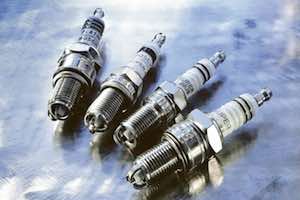On the lighter side
The Spark Plug Jungle

Just hope you don't need to replace the spark plugs of any internal combustion engine-driven implement (like lawn mowers, weed cutters, or chain saws) that may be a few years old. You could be in for a rude surprise.
The model number found on your old plug type has likely changed--repeatedly--regardless of its age and manufacturer. That's when your replacement needs start to become a problem. The same type of plug may still be manufactured and even in stock at the store. However, trying to find the current replacement model-number is akin to finding the proverbial needle in the haystack. In addition, there are more manufacturers of such things now, each using their own and frequently changing numbering systems (an updated version will be available soon).
Why do You Need Spark Plugs?
I'm not exaggerating but there are volumes of thick three-ring binders with hundreds of pages each that only exist to show you how to convert from one numbering system to the next. Some folks may think that's like manna from heaven. I happen to think that it's a great nuisance--that I term the new spark plug concept.
To begin with, spark plugs (SPs) are electrically insulated gadgets extending into the cylinders of your combustion engine. When charged with a high voltage (20,000 V, or similar) it produces an electric spark across the electrode gap that ignites the air-fuel mixture which, in turn, pushes the cylinder and drives the engine.
Over the last 100+ years of internal combustion engine technology, few improvements to that have come about. They include, amongst other things, the gap distance between the central and lateral electrodes (basically in the order of 0.05 in, more or less) and a few other minutiae in design, material, shape, thread (U.S./imperial or metric system), etc.
Basically, even today, these things are not much different from those of your parents' or grandparents' times. Internal combustion engines (other than Diesel systems) all need a spark plug to ignite the fuel/air mixture in a gasoline-powered engine cylinder, no matter how small or large it may be. Even your 1920's-era 12-cylinder Bentley has such things (good luck finding the right ones for those).
Surely it must be a tough business to be making and marketing these things. Technology that's a hundred-plus years old cannot be profitable you'd think. But here comes the surprise:  I call it the New Spark Plug Concept.
The New Spark Plug Concept
Let's call that new spark plug concept NSPC, for short. Really, it can do wonders for your system of (perhaps) outdated but nevertheless perfectly functioning combustion apparatus, like a 40-year old small outboard motor that keeps running just fine. So, in order to keep my "horses" happy, the SPs need to be replaced once every decade or two (more frequently recommended). All the high-voltage sparks across the SPs' gaps slowly corrode the metal and adventitious moisture does the rest.
In case you have any doubts, the NSPC is there to help you--not necessarily to find the right replacement for the spark plugs you need--but to encourage you to get a new whatever-(implement) altogether. Obviously, that is the best solution to your problem. Never mind that it will only cost you 20- to 100-times what new plugs and a few minutes of work (changing the plugs) would be in comparison. Be advised: You may also need a special torque-wrench and socket that allow you to apply the correct amount of tightening force to compress the seal.
Also, there is another benefit in replacing the whole combustion apparatus. That new implement looks so shiny! In fact, you might just think that it works autonomously too, without any work or input by you, except for your need to handle and control it, add gasoline and oil, lubricate and otherwise service it when required.
Really, no problem for any Jack-of all-Trades, except for the
spark plug jungle game!
Dr. Klaus L.E. Kaiser -- Bio and
Archives |
Comments
Dr. Klaus L.E. Kaiser is author of CONVENIENT MYTHS, the green revolution – perceptions, politics, and facts Convenient Myths

 Just hope you don't need to replace the spark plugs of any internal combustion engine-driven implement (like lawn mowers, weed cutters, or chain saws) that may be a few years old. You could be in for a rude surprise.
The model number found on your old plug type has likely changed--repeatedly--regardless of its age and manufacturer. That's when your replacement needs start to become a problem. The same type of plug may still be manufactured and even in stock at the store. However, trying to find the current replacement model-number is akin to finding the proverbial needle in the haystack. In addition, there are more manufacturers of such things now, each using their own and frequently changing numbering systems (an updated version will be available soon).
Just hope you don't need to replace the spark plugs of any internal combustion engine-driven implement (like lawn mowers, weed cutters, or chain saws) that may be a few years old. You could be in for a rude surprise.
The model number found on your old plug type has likely changed--repeatedly--regardless of its age and manufacturer. That's when your replacement needs start to become a problem. The same type of plug may still be manufactured and even in stock at the store. However, trying to find the current replacement model-number is akin to finding the proverbial needle in the haystack. In addition, there are more manufacturers of such things now, each using their own and frequently changing numbering systems (an updated version will be available soon).